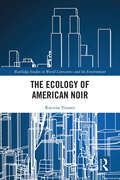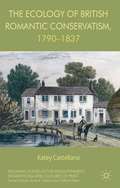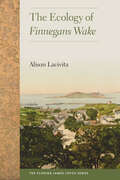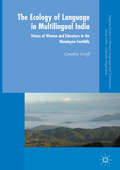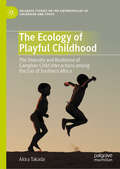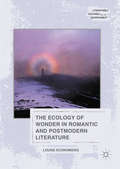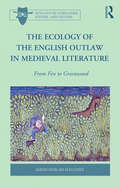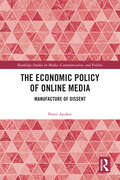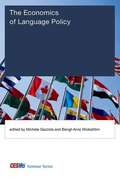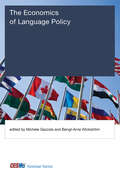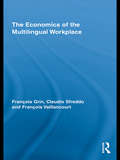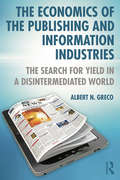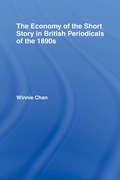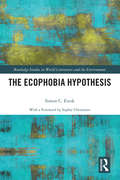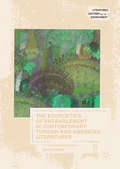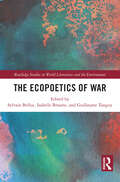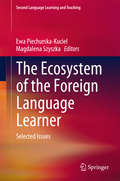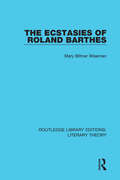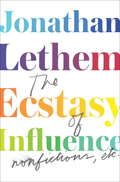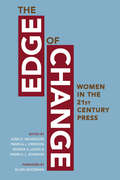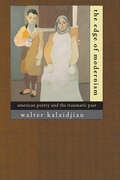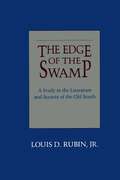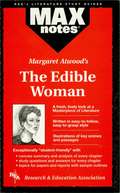- Table View
- List View
The Ecology of American Noir (Routledge Studies in World Literatures and the Environment)
by Katrina YounesThis volume investigates the relationship between the conventions of noir fiction and film and its sub-types in relation to environmental crises. Dr. Younes addresses questions that not only allow readers to (re)read early hardboiled literature and neo-noir films but also help identify a new sub-genre of noir and develop an ecocritical methodology: "eco-noir." This text traces the development of strategies of mapping urban blight and environmental deterioration in classic hardboiled fiction of the 1940s, neo-noir films of the 1970s, and eco-noir texts of the post-millennial period. Introducing the concept of eco-noir as both a sub-genre and fictional form, as well as a methodology, the volume develops a new way of understanding the relationship between noir and climate fiction texts. Through a close reading of hardboiled, neo-noir, and eco-noir texts, including those by Dashiell Hammett, Raymond Chandler, Robert Towne, Kim Stanley Robinson, and Jeff VanderMeer, it asks and addresses the question: how does each sub-genre of noir map the noir atmosphere of the private investigator's natural setting in terms of environmental toxicity? The Ecology of American Noir contributes to critical conversations in both noir and ecocritical scholarship, making clear how a new understanding of noir as defined through environmental and atmospheric conditions invites readers, viewers, and scholars of the genre to generate meaningful dialogues about our decaying and deteriorating environment.
The Ecology of British Romantic Conservatism, 1790–1837
by Katey CastellanoAnalyzing Romantic conservative critiques of modernity found in literature, philosophy, natural history, and agricultural periodicals, this book finds a common theme in the 'intergenerational imagination. ' This impels an environmental ethic in which obligations to past and future generations shape decisions about inherited culture and land.
The Ecology of Finnegans Wake (Florida James Joyce)
by Alison LacivitaIn this book—one of the first ecocritical explorations of Irish literature—Alison Lacivita defies the popular view of James Joyce as a thoroughly urban writer by bringing to light his consistent engagement with nature. Using genetic criticism to investigate Joyce’s source texts, notebooks, and proofs, Lacivita shows how Joyce developed ecological themes in Finnegans Wake over successive drafts.Making apparent a love of growing things and a lively connection with the natural world across his texts, Lacivita’s approach reveals Joyce’s keen attention to the Irish landscape, meteorology, urban planning, Dublin’s ecology, the exploitation of nature, and fertility and reproduction. Alison Lacivita unearths a vital quality of Joyce’s work that has largely gone undetected, decisively aligning ecocriticism with both modernism and Irish studies.
The Ecology of Language in Multilingual India: Voices of Women and Educators in the Himalayan Foothills (Palgrave Studies in Minority Languages and Communities)
by Cynthia GroffThis book explores the linguistic ecology of the Kumaun region of Uttarakhand, India through the experiences and discourses of minority youth and their educators. Providing in-depth examples of Indian multilingualism, this volume analyses how each language is valued in its own context; how national-level policies are appropriated and contested in local discourses; and how language and culture influence educational opportunities and identity negotiation for Kumauni young women. In doing so, the author examines how students and educators navigate a multilingual society with similarly diverse classroom practices. She simultaneously critiques the language and education system in modern India and highlights alternative perspectives on empowerment through the lens of a unique Gandhian educational context. This volume allows Kumauni women and their educators to take centre stage, and provides a thoughtful and nuanced insight into their minority language environment. This unique book is sure to appeal to students and scholars of multilingualism, sociolinguistics, language policy and minority languages.
The Ecology of Playful Childhood: The Diversity and Resilience of Caregiver-Child Interactions among the San of Southern Africa (Palgrave Studies on the Anthropology of Childhood and Youth)
by Akira TakadaWhile studies of San children have attained the peculiar status of having delineated the prototype for hunter-gatherer childhood, relatively few serious ethnographic studies of San children have been conducted since an initial flurry of research in the 1960s and 1970s. Based on the author’s long-term field research among several San groups of Southern Africa, this book reconsiders hunter-gatherer childhood using “play” as a key concept. Playfulness pervades the intricate practices of caregiver-child interactions among the San: immediately after birth, mothers have extremely close contact with their babies. In addition to the mother’s attentions, other people around the babies actively facilitate gymnastic behavior to soothe them. These distinctive caregiving behaviors indicate a loving, indulgent attitude towards infants. This also holds true for several language genres of the San that are used in early vocal communication. Children gradually become involved in various playful activities in groups of children of multiple ages, which is the major locus of their attachment after weaning; these playful activities show important similarities to the household and subsistence activities carried out by adults. Rejuvenating studies of San children and hunter-gatherer childhood and childrearing practices, this book aims to examine these issues in detail, ultimately providing a new perspective for the understanding of human sociality.
The Ecology of Wonder in Romantic and Postmodern Literature
by Louise EconomidesThis book traces the aesthetic of wonder from the romanticperiod through contemporary philosophy and literature, arguing for itsrelevance to ecological consciousness. Most ecocritical scholarship tends toovershadow discussions of wonder with the sublime, failing to treat these twoaesthetic categories as distinct. As a result, contemporary scholarship hasconflated wonder and the sublime and ultimately lost the nuances that these twoconcepts conjure for readers and thinkers. Economides illuminates importantdifferences between these aesthetics, particularly their negotiation of issuesrelevant to gender-based and environmental politics. In turn, readers canutilize the concept of wonder as an open-ended, non-violent framework incontrast to the ethos of domination that often surrounds the sublime.
The Ecology of the English Outlaw in Medieval Literature: From Fen to Greenwood (Outlaws in Literature, History, and Culture)
by Sarah Harlan-HaugheyArguing that outlaw narratives become particularly popular and poignant at moments of national ecological and political crisis, Sarah Harlan-Haughey examines the figure of the outlaw in Anglo-Saxon poetry and Old English exile lyrics such as Beowulf, works dealing with the life and actions of Hereward, the Anglo-Norman romance of Fulk Fitz Waryn, the Robin Hood ballads, and the Tale of Gamelyn. Although the outlaw's wilderness shelter changed dramatically from the menacing fens and forests of Anglo-Saxon England to the bright, known, and mapped greenwood of the late outlaw romances and ballads, Harlan-Haughey observes that the outlaw remained strongly animalistic, other, and liminal. His brutality points to a deep literary ambivalence towards wilderness and the animal, at the same time that figures such as the Anglo-Saxon resistance fighter Hereward, the brutal yet courtly Gamelyn, and Robin Hood often represent a lost England imagined as pristine and forested. In analyzing outlaw literature as a form of nature writing, Harlan-Haughey suggests that it often reveals more about medieval anxieties respecting humanity's place in nature than it does about the political realities of the period.
The Economic Policy of Online Media: Manufacture of Dissent (Routledge Studies in Media, Communication, and Politics)
by Peter AyolovThis book explores the distortion of communication online, centered around the theory that the economic policy model of online media is primarily based on the systematic manufacture of dissent. Following the media criticism tradition of Habermas and Chomsky, among others, the book shows how anger can motivate news consumption as the principle of divide-and-rule in the online media of the 21st century is systematically applied. The author posits that media addiction increases interest, therefore deliberate distortion of facts and the manufacture of dissent provide the media with a larger audience and this becomes the business model. This insightful volume will interest researchers, scholars, and students of media economics, political economy of media, digital media, propaganda, mass communication, and media literacy.
The Economics of Language Policy
by Bengt-Arne Wickström Michele GazzolaIn an era of globalization, issues of language diversity have economic and political implications. Transnational labor mobility, trade, social inclusion of migrants, democracy in multilingual countries, and companies' international competitiveness all have a linguistic dimension; yet economists in general do not include language as a variable in their research. This volume demonstrates that the application of rigorous economic theories and research methods to issues of language policy yields valuable insights. The contributors offer both theoretical and empirical analyses of such topics as the impact of language diversity on economic outcomes, the distributive effects of policy regarding official languages, the individual welfare consequences of bilingualism, and the link between language and national identity. Their research is based on data from countries including Canada, India, Kazakhstan, and Indonesia and from the regions of Central America, Europe, and Sub-Saharan Africa. Theoretical models are explained intuitively for the nonspecialist. The relationships among linguistic variables, inequality, and the economy are approached from different perspectives, including economics, sociolinguistics, and political science. For this reason, the book offers a substantive contribution to interdisciplinary work on languages in society and language policy, proposing a common framework for a shared research area.ContributorsAlisher Aldashev, Katalin Buzási, Ramon Caminal, Alexander M. Danzer, Maxime Leblanc Desgagné, Peter H. Egger, Ainhoa Aparicio Fenoll, Michele Gazzola, Victor Ginsburgh, Gilles Grenier, François Grin, Zoe Kuehn, Andrea Lassmann, Stephen May, Serge Nadeau, Suzanne Romaine, Selma K. Sonntag, Stefan Sperlich, José-Ramón Uriarte, François Vaillancourt, Shlomo Weber, Bengt-Arne Wickström, Lauren Zentz
The Economics of Language Policy (CESifo Seminar Series)
by Bengt-Arne Wickström Michele GazzolaInsights from the application of economic theories and research methods to the management of linguistic diversity in an era of globalization.In an era of globalization, issues of language diversity have economic and political implications. Transnational labor mobility, trade, social inclusion of migrants, democracy in multilingual countries, and companies' international competitiveness all have a linguistic dimension; yet economists in general do not include language as a variable in their research. This volume demonstrates that the application of rigorous economic theories and research methods to issues of language policy yields valuable insights. The contributors offer both theoretical and empirical analyses of such topics as the impact of language diversity on economic outcomes, the distributive effects of policy regarding official languages, the individual welfare consequences of bilingualism, and the link between language and national identity. Their research is based on data from countries including Canada, India, Kazakhstan, and Indonesia and from the regions of Central America, Europe, and Sub-Saharan Africa. Theoretical models are explained intuitively for the nonspecialist. The relationships among linguistic variables, inequality, and the economy are approached from different perspectives, including economics, sociolinguistics, and political science. For this reason, the book offers a substantive contribution to interdisciplinary work on languages in society and language policy, proposing a common framework for a shared research area.ContributorsAlisher Aldashev, Katalin Buzási, Ramon Caminal, Alexander M. Danzer, Maxime Leblanc Desgagné, Peter H. Egger, Ainhoa Aparicio Fenoll, Michele Gazzola, Victor Ginsburgh, Gilles Grenier, François Grin, Zoe Kuehn, Andrea Lassmann, Stephen May, Serge Nadeau, Suzanne Romaine, Selma K. Sonntag, Stefan Sperlich, José-Ramón Uriarte, François Vaillancourt, Shlomo Weber, Bengt-Arne Wickström, Lauren Zentz
The Economics of Language: International Analyses (Routledge Studies In The Modern World Economy)
by Paul W. Miller Barry R. ChiswickWritten by two internationally renowned experts in the field, this book explores the determinants of dominant language proficiency among immigrants and other linguistic minorities and the consequences of this proficiency for the labour market.Using empirical material from a range of countries, including the USA, Canada, Australia and Bolivia, the a
The Economics of the Multilingual Workplace (Routledge Studies In Sociolinguistics Ser.)
by François Grin Claudio Sfreddo François VaillancourtThis book proposes a path-breaking study of the economics of multilingualism at work, proposing a systematic approach to the identification and measurement of the ways in which language skills and economic performance are related. Using the instruments of economic investigation, but also explicitly relating the analysis to the approaches to multilingualism at work developed in the language sciences, this interdisciplinary book proposes a systematic, step-by-step exploration of the issue. Starting from a general identification of the linkages between multilingualism and processes of value creation, it reviews the contributions of linguistics and economics before developing a new economic model of production in which language is taken into account. Testing of the model using data from two countries provides quantitative estimations of the influence of multilingualism on economic processes, showing that foreign language skills can make a considerable contribution to a country’s GDP. These findings have significant implications for language policy and suggest strategies helping language planners to harness market forces for increased effectiveness. A technical appendix shows how the novel technical and statistical procedures developed in this study can be generalized, and applied wherever researchers or decision makers need to identify and measure the value of multilingualism.
The Economics of the Publishing and Information Industries: The Search for Yield in a Disintermediated World
by Albert N. GrecoBooks, scholarly journals, business information, and professional information play a pivotal role in the political, social, economic, scientific, and intellectual life of nations. While publications abound on Wall Street and financial service companies, the relationship between Wall Street’s financial service companies and the publishing and information industries has not been explored until now. The Economics of the Publishing and Information Industries utilizes substantive historical, business, consumer, economic, sociological, technological, and quantitative and qualitative methodologies to understand the people, trends, strengths, opportunities, and threats the publishing industry and the financial service sector have faced in recent years. Various developments, both economic and demographic, contributed to the circumstances influencing the financial service sector’s investment in the publishing and information industries. This volume identifies and analyzes those developments, clearly laying out the forces that drove the marriage between the spheres of publishing and finance. This book offers insight and analysis that will appeal to those across a wide variety of fields and occupations, including those in financial service firms, instructors and students in business, communications, finance, or economics programs, business and financial reporters, regulators, private investors, and academic and major public research libraries.
The Economy of the Short Story in British Periodicals of the 1890s (Literary Criticism and Cultural Theory)
by Winnie ChanThis materialist study of the short story’s development in three diverse magazines reveals how, at the dawn of modernism, commercial pressures prompted modernist formal innovation in popular magazines, whilst anti-commercial opacity paradoxically formed the basis of an effective marketing strategy that appealed to elitism. Integrating methods of cultural studies with formal analyses, this study builds upon recent work challenging Andreas Huyssen’s provocative formation, the "great divide" of modernism.
The Ecophobia Hypothesis (Routledge Studies in World Literatures and the Environment)
by Simon C. EstokThe Ecophobia Hypothesis grows out of the sense that while the theory of biophilia has productively addressed ideal human affinities with nature, the capacity of “the biophilia hypothesis” as an explanatory model of human/ environment relations is limited. The biophilia hypothesis cannot adequately account for the kinds of things that are going on in the world, things so extraordinary that we are increasingly coming to understand the current age as “the Anthropocene.” Building on the usefulness of the biophilia hypothesis, this book argues that biophilia exists on a broader spectrum that has not been adequately theorized. The Ecophobia Hypothesis claims that in order to contextualize biophilia (literally, the “love of life”) and the spectrum on which it sits, it is necessary to theorize how very un-philic human uses of the natural world are. This volume offers a rich tapestry of connected, comparative discussions about the new material turn and the urgent need to address the agency of genes, about the complexities of 21st century representations of ecophobia, and about how imagining terror interpenetrates the imagining of an increasingly oppositional natural environment. Furthermore, this book proposes that ecophobia is one root cause that explains why ecomedia—a veritably thriving industry—is having so little measurable impact in transforming our adaptive capacities. The ecophobia hypothesis offers an equation that determines the variable spectrums of the Anthropocene by measuring the ecophobic implications and inequalities of speciesism and the entanglement of environmental ethics with the writing of literary madness and pain. This work also investigates how current ecophobic perspectives systemically institutionalize the infrastructures of industrial agriculture and waste management. This is a book about revealing ecophobia and prompting transformational change.
The Ecopoetics of Entanglement in Contemporary Turkish and American Literatures
by Meliz ErginThis book foregrounds entanglement as a guiding concept in Derrida's work and considers its implications and benefits for ecocritical thought. Ergin introduces the notion of "ecological text" to emphasize textuality as a form of entanglement that proves useful in thinking about ecological interdependence and uncertainty. She brings deconstruction into a dialogue with social ecology and new materialism, outlining entanglements in three strands of thought to demonstrate the relevance of this concept in theoretical terms. Ergin then investigates natural-social entanglements through a comparative analysis of the works of the American poet Juliana Spahr and the Turkish writer Latife Tekin. The book enriches our understanding of complicity and accountability by revealing the ecological network of material and discursive forces in which we are deeply embedded. It makes a significant contribution to current debates on ecocritical theory, comparative literature, and ecopoetics.
The Ecopoetics of War (Routledge Studies in World Literatures and the Environment)
by Sylvain Belluc, Isabelle Brasme, and Guillaume TanguyThe Ecopoetics of War explores the interrelationality of human and nonhuman entities in the context of conflict, as recorded in literature and culture. This collection of essays demonstrates the specific and fertile role of literature in representations of war, as it foregrounds the manifold ways in which the borders between human and nonhuman—including flora,fauna, and technology—become porous, thus questioning traditional onto-epistemological and ethical categories.Bringing together British, American, and postcolonial studies, The Ecopoetics of War covers a variety of historical periods, geographical areas, and literary genres. Interdisciplinary in its outlook, it intertwines war studies, ecocriticism, literary theory, philosophy, and cultural studies. By analyzing the stylistic and discursive strategies devised by writers to translate the sensory experience of the battlefield, the contributors shed light on the unique capacity of literature to foreground the entanglement of human and nonhuman in the context of armed conflict, and thus unveil an “ecopoetics of war.”This collection will interest scholars of literature, specialists of war studies and ecocriticism, and any reader interested in such issues such as ecowar, ecocide, the Anthropocene, or environmental justice. It can inspire interdisciplinary teaching or research projects, especially in the current context of global environmental crisis.
The Ecosystem of the Foreign Language Learner
by Ewa Piechurska-Kuciel Magdalena SzyszkaThis volume examines selected aspects of the foreign language learning process from an ecological perspective, adopting a holistic view on complex interrelations among and within organisms (L2 language learners) and their milieus (family, school and society). First of all, the personal ecosystem of the learner is taken into consideration, whereby two powerful influences are intertwined: cognitive and affective aspects. The learning space formed by the individual is largely shaped by their affective states coexisting in conjunction with their cognitive processes. Moreover, this specific space is also modified by a wider array of other personal ecosystems or those of cultures. Hence, the ecosystem of the foreign language learner is also subject to influences coming from sociocultural leverage that can be represented by people they know, like parents and language teachers, who can both directly and indirectly manipulate their ecosystem. At the same time other important forces, such as culture as a ubiquitous element in the foreign language learning process, also have the power to shape that ecosystem. Accordingly, the book is divided into three parts covering a range of topics related to these basic dimensions of foreign language acquisition (the cognitive, affective and socio-cultural). Part I, Affective Interconnections, focuses on the body of original empirical research into the affective domain of not only L2 language learners but also non-native language teachers. Part II, Cognitive Interconnections, reports on contributions on language learners' linguistic processing and cognitive representations of concepts. The closing part, Socio-cultural Interconnections, provides new insights into language learning processes as they are affected by social and cultural factors.
The Ecstasies of Roland Barthes (Routledge Library Editions: Literary Theory #26)
by Mary Bittner WisemanIn this book, first published in 1989, Mary Bittner Wiseman interprets Roland Barthes’s experiments as efforts to reposition the human subject with respect to language and to time in order to let the subject escape from the language of a particular culture and the present time. With her insistent pushing against the boundaries of our standard academic assumptions, Mary Bittner Wiseman succeeds in interpreting Barthes’s effort to join the traditional and the new. This title will be of interest to students of literature and philosophy.
The Ecstasies of Roland Barthes (Routledge Library Editions: Literary Theory)
by Mary Bittner WisemanIn this book, first published in 1989, Mary Bittner Wiseman interprets Roland Barthes’s experiments as efforts to reposition the human subject with respect to language and to time in order to let the subject escape from the language of a particular culture and the present time. With her insistent pushing against the boundaries of our standard academic assumptions, Mary Bittner Wiseman succeeds in interpreting Barthes’s effort to join the traditional and the new. This title will be of interest to students of literature and philosophy.
The Ecstasy of Influence
by Jonathan LethemWhat's a novelist supposed to do with contemporary culture? And what's contemporary culture supposed to do with novelists? InThe Ecstasy of Influence, Jonathan Lethem, tangling with what he calls the 'white elephant' role of the writer as public intellectual, arrives at an astonishing range of answers. A constellation of previously published pieces and new essays as provocative and idiosyncratic as any he's written, this volume sheds light on an array of topics from sex in cinema to drugs, graffiti, Bob Dylan, cyberculture, 9/11, book touring and Marlon Brando. Then there are investigations of a shelf's worth of his literary models and contemporaries: Norman Mailer, Philip K. Dick, Bret Easton Ellis, James Wood, and others. And, writing about Brooklyn, his father, and his sojourn through two decades of writing, one of the greats of contemporary American literature sheds an equally strong light on himself. Funny and unfettered,The Ecstasy of Influencesimmers with direct challenges to conventional wisdom and deep insights into the kaleidoscopic nature of artistic vision, the primacy of the writer in the cultural marketplace, and the way the author's own experiences have fuelled his creative passions.
The Edge of Change: Women in the Twenty-First-Century Press
by Deb Price Ellen Goodman Margaret Sullivan Kathleen Carroll Dorothy Butler Gilliam Pamela J. Creedon Helen E Fisher Catalina Camia Paula Lynn Ellis Sharon Grigsby Carol Guzy Kirsten Hampton Cathy Henkel Pamela J. Johnson Jane Kirtley Jan Leach Caroline Little Wanda S. Lloyd Arlene Notoro Morgan June O. Nicholson Geneva Overholser Marty Petty Donna M Reed Sandra Mims Rowe Peggy Simpson Julia Wallace Keven Ann WilleyContaining nearly three dozen original essays penned by the nation's leading newspaper journalists, editors, and executives, this book advances current discussions regarding women in journalism. Surveying the past quarter century, the book's contributors highlight the unprecedented influence American women have had on the news industry, especially newspapers, and look ahead to the future for women in news. Acclaimed anthropologist and author Helen E. Fisher adds her perspective in examining the role of women across millennia and how the talents of women are changing social and economic life in this global age. Prominent female voices in journalism provide critical perspectives on the challenges women face in today's news organizations, such as connecting with diverse audiences, educating readers about international issues and cultures, maintaining credibility, negotiating media consolidation and corporate pressures, and overcoming the persistent barriers to professional advancement. A powerful and complex assessment of how women are transforming the news industry, The Edge of Change explores how the news industry might implement further reforms aimed at creating a more inclusive journalistic community. Contributors are Catalina Camia, Kathleen Carroll, Pamela J. Creedon, Paula Lynn Ellis, Helen E. Fisher, Dorothy Butler Gilliam, Ellen Goodman, Sharon Grigsby, Carol Guzy, Kirsten Scharnberg Hampton, Cathy Henkel, Pamela J. Johnson, Jane Kirtley, Jan Leach, Caroline Little, Wanda S. Lloyd, Arlene Notoro Morgan, June O. Nicholson, Geneva Overholser, Marty Petty, Deb Price, Donna M. Reed, Sandra Mims Rowe, Peggy Simpson, Margaret Sullivan, Julia Wallace, and Keven Ann Willey.
The Edge of Modernism: American Poetry and the Traumatic Past
by Walter KalaidjianIn The Edge of Modernism, Walter Kalaidjian explores American poetry on genocide, the Holocaust, and total war as well as on postwar social antagonisms, racial oppression, and domestic violence. By asking what it means for traumatic memory to have agency in the American verse tradition, Kalaidjian creates an original historical account of how American poets became witnesses, often unconsciously, to modern extremity. Combining psychoanalytic theory and cultural studies, this intense, sweeping account of modern poetics analyzes the ways in which literary form gives testimony to the trauma of twentieth-century history. Through close readings of well-known and less familiar poets—among them Langston Hughes, Countee Cullen, Claude McKay, Edwin Rolfe, Sylvia Plath, Adrienne Rich, Peter Balakian, Rachel Blau DuPlessis, Anne Sexton, and Anthony Hecht—Kalaidjian discerns the latent "edge" of modern trauma as it cuts through the literary representations, themes, and formal techniques of twentieth-century American poetics. In this way, The Edge of Modernism advances an innovative and dynamic model of modern periodization.
The Edge of the Swamp: A Study in the Literature and Society of the Old South
by Louis D. Rubin Jr.The flowering of literary imagination known as the American Renaissance had few roots in the South. While Hawthorne, Emerson, Melville, Thoreau, and Whitman were creating a body of work that would endure, the only southern writer making a lasting contribution was Edgar Allan Poe. This failure on the part of antebellum southern writers has long been a subject of debate among students of southern history and literature. Now one of the region's most distinguished men of letters offers a cogently argued and gracefully written account of the circumstances that prevented early southern writers from creating transcendent works of art.Louis D. Rubin, Jr., brings forty years of critical integrity and imaginative involvement with the history and literature of the South to his informal inquiry into the foundations of the southern literary imagination. His exploration centers on the lives and works of three of the most important writers of the pre-Civil War South: Poe, William Gilmore Simms, and Henry Timrod.In a close and highly original reading of Poe's poetry and fiction, Rubin shows just how profoundly growing up in Richmond, Virginia, influenced that writer. The sole author of the Old South whose work has endured did not use southern settings or concern himself with his region's history or politics. Poe was, according to Rubin, in active rebellion against the middle-class community of Richmond and its materialistic values.Simms, on the other hand, aspired to the plantation society ideal of his native Charleston, South Carolina. He was not the most devoted and energetic of southern writers and one of the country's best-known and most respected literary figures before the Civil War. Rubin finds an explanation for much of the lost promise of antebellum southern literature in Simms's career. Here was a talented man who got caught up in the politically obsessed plantation community of Charleston, becoming an apologist for the system and an ardent defender of slavery.Timrod, also a Charlestonian native, was a highly gifted poet whose work attained the stature of literature when the Civil War gave him a theme. He was known as the poet laureate of the Confederacy. Only when his region was locked in a desperate military struggle for the right to exist did he suddenly find his enduring voice.Anyone interested in southern life and literature will welcome his provocative and engaging new look at southern writing from one of the region's most perceptive critics.
The Edible Woman (MAXNotes Literature Guides)
by Jeffrey LilburnREA's MAXnotes for Margaret Atwood's The Edible Woman MAXnotes offer a fresh look at masterpieces of literature, presented in a lively and interesting fashion. Written by literary experts who currently teach the subject, MAXnotes will enhance your understanding and enjoyment of the work. MAXnotes are designed to stimulate independent thought about the literary work by raising various issues and thought-provoking ideas and questions. MAXnotes cover the essentials of what one should know about each work, including an overall summary, character lists, an explanation and discussion of the plot, the work's historical context, illustrations to convey the mood of the work, and a biography of the author. Each chapter is individually summarized and analyzed, and has study questions and answers.
